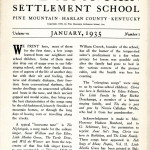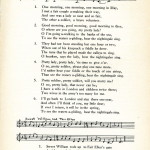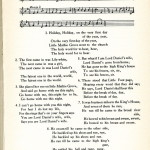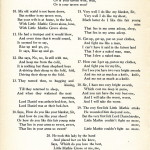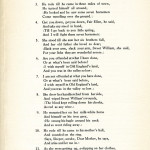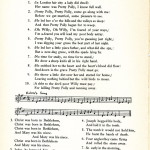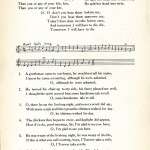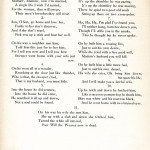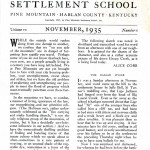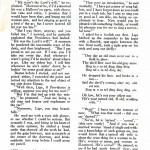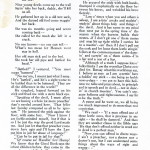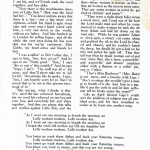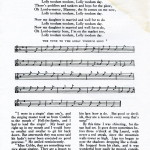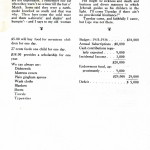Pine Mountain Settlement School
Series 17: PUBLICATIONS PMSS
NOTES – 1935
January and November
NOTES – 1935
“Notes from the Pine Mountain Settlement School”
January and November 1935
Two special issues with full lyrics of mountain ballads collected at Pine Mountain Settlement School were produced in 1935 by Evelyn K. Wells and the staff at Pine Mountain.
GALLERY: NOTES – 1935 January
We print here, most of them for the first time, a few songs learned from our neighbors and school children. – Evelyn K. Wells
- NOTES – 1935 January, page 1. [PMSS_notes_1935_jan_001.jpg]
- NOTES – 1935 January, page 2.[PMSS_notes_1935_jan_002.jpg]
- NOTES – 1935 January, page 3.[PMSS_notes_1935_jan_003.jpg]
- NOTES – 1935 January, page 4.[PMSS_notes_1935_jan_004.jpg]
- NOTES – 1935 January, page 5.[PMSS_notes_1935_jan_005.jpg]
- NOTES – 1935 January, page 6.[PMSS_notes_1935_jan_006.jpg]
- NOTES – 1935 January, page 7.[PMSS_notes_1935_jan_007.jpg]
- NOTES – 1935 January, page 8.[PMSS_notes_1935_jan_008.jpg]
TAGS: NOTES – 1935 JANUARY: folk songs, musical notes, lyrics, “releegious” songs, “Singing Willie” Nolan, Child ballads, Minnie Callahan Wells, Edna Feltner, May Ritchie Deschamps, Florence Hudson Botsford, G. Schirmer Inc., Evelyn K. Wells, lonesome tunes, “The Nightingale”, “Pretty Polly”, “Sweet William and Fair Ellen”, “Little Mathie Grove”, “Will the Weaver”, “Edna’s Song”, “Aunt Sal‘s Song”
TRANSCRIPTION: 1935 January
P. 1
NOTES FROM THE PINE MOUNTAIN SETTLEMENT SCHOOL
PINE MOUNTAIN * HARLAN COUNTY * KENTUCKY
Copyright, 1935, by Pine Mountain Settlement School, Inc.
Volume VII JANUARY, 1935 Number 1
WE PRINT here, most of them for the first time, a few songs learned from our neighbors and school children. Some of them must alas drop out of usage even in our folk-singing school, with their frank discussion of aspects of the life of another day; but with their wit and feeling, their terse and dramatic dialogue, their freedom from conventional rhythms, their tender dwellings on unaccented syllables and beats in the tune, and their ancient gapped and modal scales, they bring you the best characteristics of the songs sung by the old-fashioned, leisurely firesides of mountain homes, or through the long days of hoeing corn or travelling along the creeks.
A typical “lonesome tune” is The Nightingale, a song made for the solitary singer. Sweet William and Fair Ellen, Little Mathie Grove, The Turtle Dove, and Will the Weaver are from the repertoire of that fine folk singer known to our countryside as “Singing Willie” Nolan. The first two, and Pretty Polly are versions of Child ballads. Aunt Sal’s Song, taught us by the wife of Uncle William Creech, founder of the school, has all the humor of the tongue-tied suitor’s predicament in a day when privacy for lovers was possible only after the family had gone to bed in the various corners of the pioneer cabin, and the hearth was free for courting.
The “releegious songs” were sung to us by various school children: Christ was born in Bethlehem by Edna Feltner, The Little Family by May Richie Deschamps, a member of a famous singing family, and The day is past and gone by Ninnie Callahan Wells, who had it from her grandmother.
Acknowledgment is made to Mrs. Florence Hudson Botsford, and to G. Schirmer, Inc., for permission to reprint Aunt Sal’s Song, Christ was born in Bethlehem, and The Little Family. These songs have appeared in Folk Songs of Many Peoples, Vol. II. Little Mathie Grove has been printed in Bulletin No. 4 of the Folk Song Society of the Northeast.
EVELYN K. WELLS
P. 2
The Nightingale
[musical notation]
1. One morning, one morning, one morning in May,
I met a fair couple a-making their way,
And one was a lady so neat and so fair,
The other a soldier, a brave volunteer.
2. Good morning, good morning, good morning to thee,
O where are you going, my pretty lady?
O I’m going a-walking to the banks of the sea,
To see the waters a-gliding, hear the nightingale sing.
3. They had not been standing but one hour or two,
When out of his knapsack a fiddle he drew.
The tune that he played made the valleys to ring.
O hearken, says the lady, how the nightingales sing.
4. Pretty lady, pretty lady, ’tis time to give o’er.
O no, pretty soldier, please play one tune more.
I’d rather hear your fiddle or the touch of one string,
Than see the waters a-gliding, hear the nightingale sing.
5. Pretty soldier, pretty soldier, will you marry me?
O no, pretty lady, that never can be;
I have a wife in London and children twice three;
Two wives in the army’s too many for me.
6. I’ll go back to London and stay there one year,
And often I’ll think of you, my little dear;
If ever I return, it will be in the spring,
To see the waters a-gliding, hear the nightingale sing.
Sweet William and Fair Ellen
[musical notation]
1. Sweet William rode up to Fair Ellen’s gate
And he sounded on the ring.
: No one no readier than she was
To arise and let him in. :
Sweet William and Fair Ellen (Continued on next page [page 5] )
P. 3
Little Mathie Grove
[musical notation]
1. Holiday, Holiday, on the very first day of the year, year,
On the very first day of the year,
Little Mathie Grove went to the church
The holy word for to hear, hear,
he holy word for to hear.
2. The first came in was Lily-white,
The next came in was a girl,
The next came in was Lord Daniel’s wife,
The fairest one in the world, world,
The fairest one in the world.
3. She placed her eye on little Mathie Grove,
And said go home with me this night;
Go home with me, this night for to lie,
Go home with me this night.
4. I can’t go home with you this night,
For fear I do lost my life,
For the rings that’s on your fingers says
You are Lord Daniel’s wife, wife,
Says you are Lord Daniel’s wife.
5. But what if I am Lord Daniel’s wife,
Lord Daniel’s gone from home;
He has gone to the high King’s house
To see his fences, sir, sir,
To see his fences, sir.
6. There stood that Little Foot page,
Hearing every word that they did say;
He says, Lord Daniel shall hear this
Before the break of day, day,
Before the break of day.
7. It was fourteen miles to the King’s House,
And seven of them he run;
He run till he came to the broad river side,
He bowed to his breast and swum, swum,
He bowed to his breast and swum.
8. He swum till he came to the other side,
He buckled up his shoes and run, run,
He buckled up his shoes and run.
He run till he came to the high king’s gate,
He rattled his bell and rung, rung,
He rattled his bell and rung.
Little Mathie Grove (Continued on next page)
P. 4
Little Mathie Grove (Continued)
9. The first came out was Lord Daniel,
Said, what news have you to tell,
Is your old scafel a-burning down,
Or is your tavern won, won,
Or is your tavern won?
10. My old scafel is not burnt down,
But neither is my tavern won,
But your wife is at home, in the bed,
With Little Mathie Grove alone, lone,
With Little Mathie Grove alone.
11. He had a trumpet and it would blow,
And every time that it would sound,
It seemed for to say,
Rise up and go, go,
It says, Rise up and go.
12. She says, No, no, lie still with me,
And keep me from the cold,
It is nothing but them shepherd boys
A-driving their sheep to the fold, fold,
Driving their sheep to the fold.
13. They turned then, to hugging and kissing,
Till they returned to sleep,
And when they wakened the next morning,
Lord Daniel was at their bed-feet, feet,
Lord Daniel was at their bed-feet.
14. Says, How do you like your blanket, Sir,
And how do you like your sheet?
Or how do you like this fair young miss
That lies in your arms so sweet, sweet,
That lies in your arms so sweet?
15. Very well I do like my blanket, Sir,
Very well I do like my sheet,
Much better do I like this fair young miss
That lies in my arms asleep, sleep,
That lies in my arms asleep.
16. Get up, get up, put on your clothes,
And fight me like a man,
I can’t have it said in the fairest land
That I slew a naked man, man,
That I slew a naked man.
17. How can I get up, put on my clothes,
And fight you for my life,
For I see you have two very bright swords
And me not as much as a knife, knife,
And me not as much as a knife.
18. Sir, I have two very bright swords,
Which cost me deep in purse,
And you can have the very best one,
And I will take the worst, worst,
And I will take the worst.
19. The very first lick Little Mathie stroke
He wounded him deep and sore,
But the very first lick Lord Daniel stroke,
Little Mathie couldn’t fight no more, more,
Little Mathie couldn’t fight no more.
20. He took this lady by the hand
And placed her on his knee,
Says, Which do you love the best,
Little Mathie Grove or me, me,
Little Mathie Grove or me?
Little Mathie Grove (Continued on next page [page 7])
P. 5
Sweet William and Fair Ellen (Continued)
2. He mounted her on a milk-white horse
And himself on an iron gray,
:He swung his bugle about his neck
And so went riding away.:
3. He rode till he came in three miles of town,
He turned himself all around;
:He looked and he saw some seven horsemen
Come travelling over the ground.:
4. Get you down, get you down, Fair Ellen, he said,
And take my steed in hand,
Till I go back to yon little spring,
And I will fight them seven horsemen:
5. She stood till she saw her six brothers fall,
And her old father she loved so dear;
:Slack your arm, slack your arm, Sweet William, she said,
For your licks they are wonderful severe.:
6. Are you offended at what I have done,
Or at what’s been said before?
I wish myself in Old England’s land,
And you was in the valley so low:
7. I am not offended at what you have done,
Or at what’s been said before,
I wish myself in Old England’s land,
And you was in the valley so low.:
8. She drew her handkerchief from her side,
And wiped Sweet William’s wounds,
The blood kept rolling down his cheeks,
As red as any wine.:
9. He mounted her on her milk-white horse
And himself on his iron grey,
:He swung his bugle around his neck
And so went riding away.:
10. He rode till he came to his mother’s hall,
And sounded on the ring.
:Says, Sleeper, awake, Dear Mother, he says,
And arise and let me in.:
11. As she were getting up, a-slipping on her clothes,
To let Sweet William in,
:Bind up my head, sweet sister, he said,
For you never will bind it again.:
P. 6.
Pretty Polly (deliberately)
[musical notations]
1. In London fair city a lady did dwell:
Her name was Pretty Polly, I know full well.
2. Pretty Polly, Pretty Polly, come go along with me:
Before we get married, some pleasure to see.
3. He led her o’er the hills and the valleys so deep:
And then Pretty Polly began for to weep.
4. Oh Willy, Oh Willy, I’m feared of your ways,:
I’m a-feared you will lead my poor body astray.
5. Pretty Polly, Pretty Polly, you’re guessing just right,:
I was digging your grave the best part of last night.
6. He led her a little piece futher, and what did she spy,:
But a new-dug grave, with the spade lying by.
7. No time for study, no time for to stand,:
He drew a sharp knife all in his right hand.
8. He stobbed her to the heart and the heart’s blood did flow:
And down in the grave Pretty Polly must go.
9. He threw a little dirt over her and started for home,:
Leaving nothing behind but the wild birds to moan.
10. A debt to the devil poor Willy must pay,:
For killing Pretty Polly and running away.
Edna’s Song
[musical notations]
1. Christ was born in Bethlehem,
Christ was born in Bethlehem,
Christ was born in Bethlehem,
And Mary was his niece.
And Mary was his niece.
Christ was born in Bethlehem
And Mary was his niece.
2. Judas, he betrayed him, etc.
And sold him to the Jews.
3. The Jews, they crucified him, etc.
And laid him in the tomb..
4. Joseph begged his body,
And laid it in the tomb.
5. The tomb it would not hold him,
He burst the bands of death.
6. Four [angels] they came flying
And rolled the stone away.
7. So early in the morning,
Mary came weeping.
8. O what’s the matter, Mary?
They’ve stole my Lord away.
9. O go and tell my brethren
That Jesus has arose.
p. 7
Little Mathie Grove (Continued)
21. Very well I do like your red rosy cheeks,
Much better do I like your chin,
Much better do I like Little Mathie Grove.
Than you or any of your kin, kin,
Than you or any of your kin.
22. He took this lady by the lily-white hand,
He led her out in the lane,
He drew his sword from his side,
He split her head into twin, twin,
He split her head into twin.
23. O don’t you hear them larkins say,
Don’t you hear them sparrows cry,
Today I have slain two the fairest ones,
And tomorrow I will have to die, die,
Tomorrow I will have to die.
Aunt Sal’s Song
1.A gentleman came to our house, he would not tell his name,
I knew he came a-courting, although he were ashamed.
O, although he were ashamed.
2. He moved his chair up to my side, his fancy pleased me well,
I thought the spirit moved him some handsome tale to tell.
O, some handsome tale to tell.
3. O, there he sat the livelong night, and never a word did say,
With many a sigh and bitter groan he ofttimes wished for day.
O, he ofttimes wished for day.
4. The chickens they begun to crow, and daylight did appear,
How d’ye do, good morning, Sir, I’m glad to see you here,
O, I’m glad to see you here.
5. He was weary of the livelong night, he was weary of his life,
If this is what you call courting, boys, I’ll never take a wife,
O, I’ll never take a wife.
6. And when he goes in company, the girls all laugh for sport,
Saying, Yonder goes that ding-dang fool, he don’t know how to court,
O, he don’t know how to court.
P. 8
Will the Weaver (gaily)
1.
Mamaw, Mamaw, now I’m married,
A single life I wish I’d tarried,
For the women, they will swear,
Their men’s breeches they will wear.
2.
Son, O Son, go home and love her,
Faults to her don’t discover,
And if she don’t repel,
Pick you up a stick and beat her well.
3.
On his way a neighbor met him,
Told him this just for to fret him,
For I tell you now and I tell you how
Sweeper went home with your wife just now.
4.
On he went all in a wonder,
Knocking at the door just like thunder,
Who is that, the sweeper cried,
That is my husband, you must hide.
5.
Into the house he did venture,
Into the house he did enter,
He searched it all up and down,
Not a soul could be found.
6.
It’s up the chimbley he was gazing,
It’s up the chimbley he was mazing,
There he spied two poor old souls
Sitting up there on two cross-poles.
7.
Ha, Ha, Ha, I’m glad I’ve found you,
I’ll neither hang, burn nor drown you,
Though I’ll stifle you in the smoke.
This he thought but he never spoke.
8.
On he built him a rousing fire,
Just to suit his own desire,
While she cried with a free good will,
Madam’s husband you will kill.
9.
On he built him a little more fuel,
Just to suit his own desuel,
His wife she cries, Oh bring him down, but spare his life,
And I will make you a lawful wife.
10.
Up he retch and down he fetched him,
Like a raccoon-possum dog he shuck him,
Shirt was white and his coat was black,
And he went home with two bruised eyes.
11.
On his way his wife she met him,
She up with a club and down she fetched him,
Turned the white all into red,
Poor Will the Weaver now is dead.
Set Up and Printed by Students of
PINE MOUNTAIN SETTLEMENT SCHOOL
GALLERY: NOTES – 1935 November
“The Ballad Singer,” a story by one of our neighbors, is printed for the charm of the character [Lige Jackson], and [is] also a rather accurate picture of life down Greasy Creek,as it is being lived today. – Alice Cobb
- NOTES – 1935 November, page 1. [PMSS_notes_1935_nov_001.jpg]
- NOTES – 1935 November, page 2.[PMSS_notes_1935_nov_002.jpg]
- NOTES – 1935 November, page 3.[PMSS_notes_1935_nov_003.jpg]
- NOTES – 1935 November, page 4.[PMSS_notes_1935_nov_004.jpg]
- NOTES – 1935 November, page 5.[PMSS_notes_1935_nov_005.jpg]
- NOTES – 1935 November, page 6.[PMSS_notes_1935_nov_006.jpg]
TAGS: NOTES – 1935 NOVEMBER: “The Ballad Singer “, Greasy Creek, “flood of progress”, Big Laurel Creek, Lige Jackson, Alice Cobb, Silas [Si] Turner, financial statement, budget, musical notations, lyrics, Sally Bell, “Lolly Toodum”, Hell-fer-Sartin, ballads
TRANSCRIPTION: 1935 November
[For a full transcription of the November 1935 “Notes,” go to ALICE COBB STORIES The Ballad Singer PMSS Notes Nov. 1935.]
Next:
NOTES – 1936
Previous:
NOTES – 1934 [NO ISSUES FOUND]
See Also:
ALICE COBB STORIES The Ballad Singer PMSS Notes Nov. 1935
MUSIC and DANCE Guide
PMSS Song Ballads and Other Songs 1923
WELLS Record 14 – PMSS Folk Songs and Dances 1913-1928
Return To:
NOTES Index

